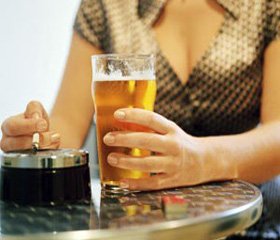Международный неврологический журнал 6 (60) 2013
Вернуться к номеру
Psychovegetative dysfunction and tolerance to bad habits - risk factors for stroke in the formation of schoolchildren at various stages of learning
Авторы: V.B. Laskov, I.V. Laskova - Department of Neurology and Neurosurgery, Kursk State Medical University, Russia, Kursk
Рубрики: Неврология
Разделы: Клинические исследования
Версия для печати
A large role in psycho-emotional and troublesome somatoneurological disorders in school children playing vegetative dysfunction syndrome (VDS). It is based on the restructuring of puberty, constitutional features and residual dysontogenesis. With an additional negative impact has been increasing mental and / or neurosomatic component VDS and reduced quality of life of a young man, his adaptation and effective learning. Among these influences - bad habits as smoking, alcohol, soft drinks and drugs that act risk factors of hypertension and stroke.Traditional programs for primary prevention of risk factors of stroke and other socially significant neurological disorders are not sufficiently effective and do not take into account the misconceptions young people about the consequences of bad habits in terms of existing perverse traditions of the population. To solve the problem of preventing and correcting psychovegetative dysfunction on the basis of health, increase student awareness about the consequences of bad habits - stroke risk factors could support the concept of neurological student at the stages of growing up and implementation of a program of preventive prevention of these risk factors.The purpose of the study - justification of the concept of neurological student support for the prevention and correction of psycho-vegetative disorders, parenting conscious commitment to a healthy lifestyle.
Material and methods. At 195 students 3, 7 and 10 Classes two schools examined neurological status, presence and depth of autonomic dysfunction with the "Questionnaire for signs of autonomic changes" First Moscow State Medical University (further - the questionnaire). Given the impact of puberty on the frequency and severity of VDS, we calculated age ratios (confidence level) for the questionnaire at p <0.01 (for third graders - 11 ÷ 23 points, seventh -15 ÷ 23, the tenth grade - 17 ÷ 25).
Awareness among schoolchildren about bad habits and their relationship to them is determined by the original anonymous questionnaires. With the help of visual analogue scales figured school self-evaluation of their health, the excitement before school, after school fatigue. To assess depressive symptoms scale used Center for Epidemiological Studies-Depression (CES-D).Design, setting, and test material, as well as informed consent approved by the Regional Ethics Committee. Statistical processing carried out in accordance with generally accepted criteria. Results. According to the questionnaire, 29% of pupils of 3, 34% - 2% and 32 - 10 classes identified psycho-vegetative dysfunction, despite the lack of complaints about the state of health in a conversation with the doctor. The prevalence of VDS in seventh graders is probably associated with puberty. Vegetative crises (syncope, panic attacks, respiratory crises) had more than 30% of students in all three categories.
Complaints to a reduced capacity for work and sleep disorders due to maturation step-school children grew (from 45 to 68%). We have identified students whose degree of anxiety before school significantly exceeded that of their classmates. Each class had students with severe and persistent feelings of loneliness, sadness, lack of understanding from others. Pupils with severe fatigue and depressed mood after school required special attention from parents and teachers.From 18 to 25% of the students consider ideas about the harmful effects of smoking exaggerated. Smoking among classmates meet 10% of students in grades 3 and 60-70% - 7 th and 10 th grades. The share of those who have tried smoking and who offered a cigarette, rises from third to tenth grade, reaching respectively 60% and 80%. Smoke regularly from 5% of students in grades 3 to 27% - 10 classes, in these classes, respectively, 40% and 52% of students believe that quit smoking as soon as they want.
Drinking alcohol classmates saw 22% of students in grades 3, 67% - 7 th grade and 86% - 10 th grades. This indicates a lack of tolerance to alcohol consumption. The share drank beer in 3 classes - 18%, in the 7 th and 10 th - 58 and 82%. Likewise, the trend looks drink wine and vodka, but the performance by 5-13% lower. Concern is the opinion of 12% of pupils of 3, 32 and 32% of the 7th and 10th grades on the benefits of moderate doses of alcohol. Respectively 45, 48 and 61% of students believe that they can always quit drinking alcohol, as they will.Confident of recovering drug addicts 25% of students 3 and 7-8% of the pupils of the 7th and 10th grades.
Conclusions. These data indicate a high incidence of VDS students. Attention should focus on the students to be out of focus, but functionally significant psycho-vegetative features that are prone to depression. This allows for early correction VDS, which will improve the adaptation to the requirements of the educational process, exam stress, negative influences micro social environment.Low commitment of our respondents healthy life served as the basis for the development of a pilot educational project "Give Me Health" under the municipal program "Building a healthy lifestyle." Purpose - correction of misconceptions and gaps in competencies students, their parents and teachers on the issue. The project is addressed to students from the age of 10, their parents and teachers, piloted in 2012 in high school and camp adaptation of first-year medical students of the University. In 2013, the project was implemented by staff of the Department of Neurology and Neurosurgery and the Department of public health schools in the city of Kursk Railway District in the format of "Round Table."
Participation in the program students, their parents and teachers as allies and like-minded people to create a "magic circle" in which a young person will feel comfortable emotionally and information and be able to resist unhealthy traditions.

